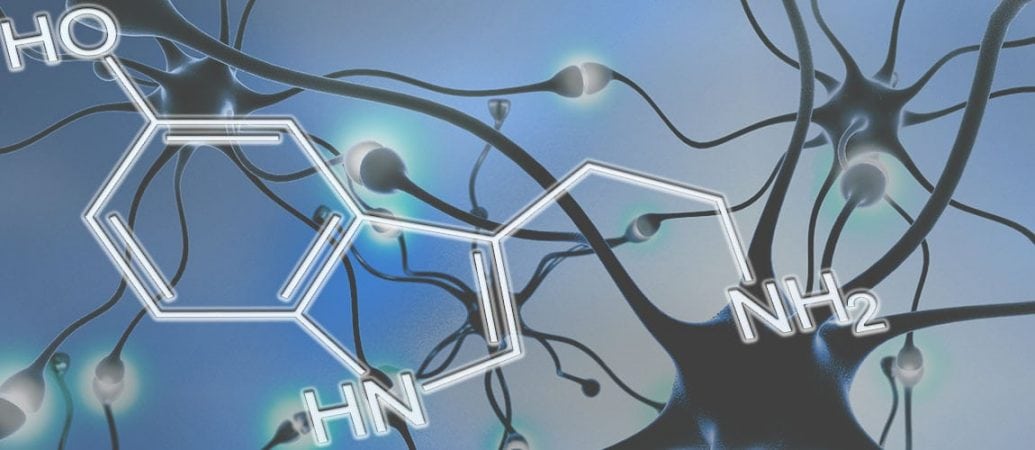According to new data from the Champalimaud Centre for the Unknown (CCU) and University College London (UCL), the neurotransmitter serotonin plays a vital role in the learning process, helping to speed learning. Researchers believe this explains why selective serotonin reuptake inhibitor (SSRI) antidepressants are more effective when combined with cognitive behavioral therapy (CBT). Their findings were recently published in the journal Nature Communications.
The Different Roles of Serotonin
Serotonin, also known as 5-hydroxytryptamine (5-HT), is one of the major chemicals that nerves use for communication. It impacts every part of our bodies, but there is still much about the neurotransmitter and its many roles that is relatively unknown. Neuroscientists have long pursued an integrated theory as to exactly what serotonin does within the body and brain, but pinning down all of serotonin’s functions is a challenge.
Most commonly associated with mood regulation, we know that serotonin plays a variety of other key roles throughout the body. Around 90 percent of the body’s serotonin is actually located within the gastrointestinal tract, where it helps to regulate intestinal motility. Serotonin is also stored within blood platelets, acting as a vasoconstrictor during the clotting process. The rest of the body’s serotonin is synthesized by the central nervous system, where it aids in the regulation of appetite, behavior, mood, and sleep.
Previous research has linked serotonin with memory and neuroplasticity. This newest study supports those findings and provides further insight into serotonin’s effect on cognitive function.
Serotonin Enhances Learning Speed
In this latest study on the well-known neurotransmitter, researchers conducted a series of mice trials in which they observed that when serotonin neurons were artificially activated via light, an emerging technique referred to as optogenetics, the mice were quicker to adapt their behavior.
According to Zach Mainen, one of the study’s lead authors, “the study found that serotonin enhances the speed of learning. When serotonin neurons were activated artificially, using light, it made mice quicker to adapt their behavior in a situation that required such flexibility. That is, they gave more weight to new information and therefore changed their minds more rapidly when these neurons were active.”
To arrive at this conclusion, the researchers observed how mice reacted in a basic learning task where the goal was for the mice to get water from one of two sources. According to study co-author Madalena Fonseca of the CCU, “animals were placed in a chamber where they had to poke either a water-dispenser on their left side or one on their right, which, with a certain probability, would then dispense water, or not.”
The amount of water released and which dispenser it was released from was randomized so that the mice would need to continually adapt their strategy. In some of the trials, the researchers used the optogenetics technique to artificially boost serotonin release. Analyzing the data using a computational model developed by study co-author Kiyohito Iigaya of UCL, the team observed that the mice seemed to exhibit two distinct approaches to decision making depending on how quickly they made their choice.
Working Memory and Long-Term Memory: Two Different Learning Strategies
According to Iigaya, “To our surprise, we found that animals’ choice behavior was generated from two distinctive decision systems. On most trials, choice was driven by a ‘fast system’, where the animals followed a win-stay-lose-switch strategy. But on a small number of the trials, we found that this simple strategy didn’t explain the animals’ choices at all.”
It was this smaller subset of trials that revealed serotonin’s effect on the decision-making process. “Serotonin is always enhancing learning from reward, but this effect is only apparent on a subset of the animals’ choices,” said CCU co-author Masayoshi Murakami.
In the faster system, the mice relied on their working or short-term memory. However, when the interval between trials was longer, the mice utilized their long-term memory of all previous trials. According to their data, serotonin boosted learning from the history of all past rewards, but only affected the choices that were made during these longer intervals.
Iigaya explains, “on these trials, we instead found that animals followed their ‘slow system,’ in which it was the reward history over many trials, and not only the most recent trials, that affected their choices. Moreover, serotonin affected only these latter choices, in which the animal was following the slow system.”
The team believes that their findings may explain why SSRIs, which is a type of antidepressant that increases serotonin levels, is significantly more effective when combined with cognitive behavioral therapy, which is a form of therapy. The authors state, “our results suggest that serotonin boosts [brain] plasticity by influencing the rate of learning. This resonates, for instance, with the fact that treatment with an SSRI can be more effective when combined with so-called cognitive behavioral therapy, which encourages the breaking of habits in patients.



Leave a Reply